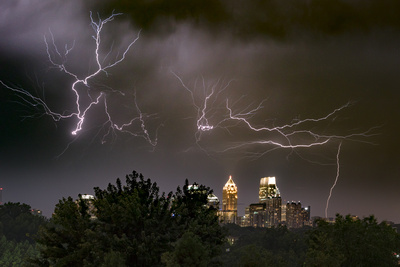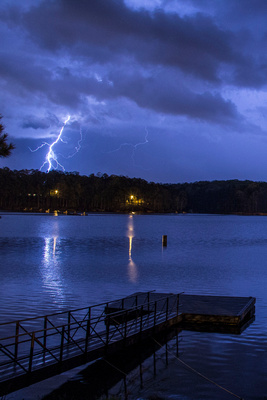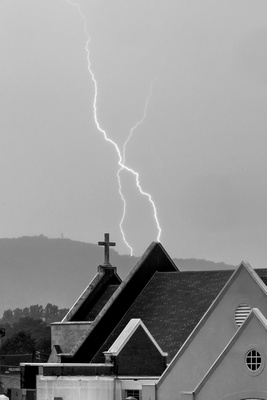Lightning Photography - The Weather Channel Guest Appearance
Last Friday, The Weather Channel invited me on air once again to discuss one of my favorite passions; capturing lightning photography. This was my 3rd appearance on The Weather Channel, interviewed once again by 2 of the best in the biz, Maria LaRosa and Alex Wallace. It's always such a pleasure sharing my work on TWC, with people who geek out over the beauty of weather as much as I do. We chatted about some of my favorite lightning shots, the way composition can separate a true photograph of lightning from plain ol' snapshots, how to keep yourself safe, and just how to go about shooting lightning in general.
So I was thinking, this would make a great topic to share in my blog, go into a little more detail about what we talked about on-air, and share a few tips the viewers have not yet heard.
 Midtown POV © Bill RushLightning strikes late at night over the Midtown Atlanta Skyline
Midtown POV © Bill RushLightning strikes late at night over the Midtown Atlanta Skyline The first thing we talked about was how I try to capture a moment, not just a snapshot of lightning. To me, it's all about how you compose the shot. Find an interesting foreground and the lightning streaking across the sky will tell a story. If you're standing in a parking lot and see lightning overhead that's cool & all, but if you track a storm coming in, take the time to visualize how you want to catch that lightning & really visualize something magic. It's been almost 5 years since I first saw this view of Atlanta's midtown skyline and just knew I had to catch lightning over it some day. Every storm that would roll into Atlanta from the west, I'd stop what I was doing to see if it was possible to head to the top of a building in the Virginia Highlands neighborhood I shot this one from, set up a tripod on the balcony and try to catch lightning in a bottle as they say. One night last June it finally paid off, I captured what you see here, which was ultimately commissioned by Atlanta Beltline Inc and printed on corrugated metal to be exhibited in one of the largest public art shows of the southeast. To me, shooting lightning is a perfect metaphor for life, you visualize what you want, put in the work and have the patience, and one day it might happen.
The first thing we talked about was how I try to capture a moment, not just a snapshot of lightning. To me, it's all about how you compose the shot. Find an interesting foreground and the lightning streaking across the sky will tell a story. If you're standing in a parking lot and see lightning overhead that's cool & all, but if you track a storm coming in, take the time to visualize how you want to catch that lightning & really visualize something magic. It's been almost 5 years since I first saw this view of Atlanta's midtown skyline and just knew I had to catch lightning over it some day. Every storm that would roll into Atlanta from the west, I'd stop what I was doing to see if it was possible to head to the top of a building in the Virginia Highlands neighborhood I shot this one from, set up a tripod on the balcony and try to catch lightning in a bottle as they say. One night last June it finally paid off, I captured what you see here, which was ultimately commissioned by Atlanta Beltline Inc and printed on corrugated metal to be exhibited in one of the largest public art shows of the southeast. To me, shooting lightning is a perfect metaphor for life, you visualize what you want, put in the work and have the patience, and one day it might happen.
From there we moved on to an important topic when shooting lightning...safety. I mean come on, it's enough jigawatts of electricity to send a Delorean back to 1985, the stuff can be deadly. Like I said on the air, it's not worth dying for. Aside from the obvious lightning, thunderstorms bring with them winds and rain and can down trees or even turn into a tornado if you're not paying attention. I had that happen once, I had my camera trained on one horizon watching for lightning, and behind me a supercell developed & as rotation began I barely had time to get myself inside the building (Weather Channel studios ironically enough) before tree limbs started falling and roofs started coming off buildings. Never mind the lightning, flying debris could've easily ended my adventures on this planet.
So for safety sake, 3 things to consider:
-
 Serenity © Bill RushLightning Strikes over Lake Allatoona in Cherokee County, GA
Serenity © Bill RushLightning Strikes over Lake Allatoona in Cherokee County, GA Watch the storm closely. Keep an app on your phone and USE IT. The Weather Channel's Storm Radar app is awesome. You can see where the storm has been, where it's going, what cells have good active lightning, and when you need to get your butt inside. It's also a great tool to figure out where a storm is headed beforehand so you can go plan your shot.
Watch the storm closely. Keep an app on your phone and USE IT. The Weather Channel's Storm Radar app is awesome. You can see where the storm has been, where it's going, what cells have good active lightning, and when you need to get your butt inside. It's also a great tool to figure out where a storm is headed beforehand so you can go plan your shot. - Remote triggers are your friend. Once you've composed your shot and set up your camera, a lightning trigger that hits the shutter for you when it see's a flash or a remote that you can trigger manually from a safe distance will allow you to leave your gear on a tripod out in the elements and capture the magic all from the safety of your own storm shelter.
- Seek Shelter. Shoot from inside a building, a parking garage, a car, whatever you need for protection. Just because lightning is outdoors, doesn't mean you have to be. Some of my favorite skyline shots are from covered rooftops, balconies, and parking garages of other buildings in the area. Use what you've got available. If you can't safely get the shot, don't get the shot. It's pretty simple really.
 Crisis Of Faith © Bill RushLightning strikes Kennesaw Mountain behind a church in Marietta, GA
Crisis Of Faith © Bill RushLightning strikes Kennesaw Mountain behind a church in Marietta, GA  Finally, we touched briefly on the equipment you need in order to capture lightning. This of course varies A LOT. My standby is a good full frame Canon body with a 24-70 lens, mounted to a tripod of course, and shooting 5-10 second long exposures one after another until hopefully I get lucky and lightning shoots through the frame I've composed. I also have a neat little trigger called a Lightning Bug that will trip the shutter for me the instant lightning illuminates the sky, though to be honest I've had better luck capturing my photos with long exposures than relying on a sensor. The analogy I gave Maria & Alex was like fishing. If you wait 'til you see a fish and then try throwing a line at it, you're not going to catch the fish very often...you want your line in the water before he gets there so that when he passes you can catch him. Same thing with photography, if the shutter is open before that lightning strikes, you'll catch it when it does.
Finally, we touched briefly on the equipment you need in order to capture lightning. This of course varies A LOT. My standby is a good full frame Canon body with a 24-70 lens, mounted to a tripod of course, and shooting 5-10 second long exposures one after another until hopefully I get lucky and lightning shoots through the frame I've composed. I also have a neat little trigger called a Lightning Bug that will trip the shutter for me the instant lightning illuminates the sky, though to be honest I've had better luck capturing my photos with long exposures than relying on a sensor. The analogy I gave Maria & Alex was like fishing. If you wait 'til you see a fish and then try throwing a line at it, you're not going to catch the fish very often...you want your line in the water before he gets there so that when he passes you can catch him. Same thing with photography, if the shutter is open before that lightning strikes, you'll catch it when it does.
Now of course you don't have to have this high end equipment, there are still plenty of ways to capture lightning. Work with what you have available. As you may have heard before, the best camera on the planet is the one in your hand when you need it. If you have a point & shoot that lets you set a manual shutter speed, you can still do a long exposure on a tripod just like I do with my full frame DSLRs. If all you have is a camera phone, you can press & hold the shutter button to shoot rapid fire shots & try to catch a still photo, or even shoot video of the sky and go back afterwards to capture a screenshot of the moment in your video where lightning hits. The most important thing about shooting lightning isn't the equipment you use, it's the vision you share.
To see more of my lightning photos, and order prints of your favorites, click here to visit my Elements gallery!
In case you missed it, here is the full interview with Maria and Alex from Friday morning's Weather Center Live courtesy of The Weather Channel.
Capturing Lightning PhotographyThe Weather Channel's Maria LaRosa and Alex Wallace interview Bill Rush on capturing lightning photography